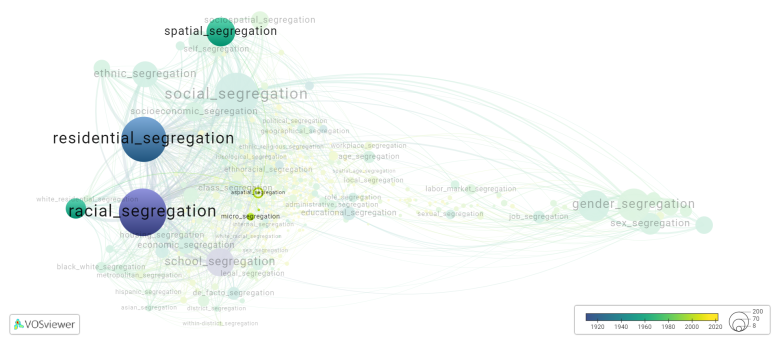Aspatial segregation: Difference between revisions
(Creating page) |
(Creating page) |
||
| (9 intermediate revisions by the same user not shown) | |||
| Line 1: | Line 1: | ||
===== Date and country of first publication<ref>Date and country of first publication as informed by the Scopus database (December 2023).</ref>===== | |||
2008<br> | 2008<br> | ||
United | United States | ||
===== Definition ===== | |||
Aspatial segregation refers to the social and economic division of people along lines of race, class, or other factors, without a physical separation or geographic boundary. This type of segregation can still have a powerful impact on the opportunities and resources available to different groups of people, creating disparities in wealth, education, employment, and other areas of life. Examples of aspatial segregation can be seen in neighborhoods, schools, workplaces, and other community settings where certain groups of people are marginalized or excluded from full participation and access to resources. | Aspatial segregation refers to the social and economic division of people along lines of race, class, or other factors, without a physical separation or geographic boundary. This type of segregation can still have a powerful impact on the opportunities and resources available to different groups of people, creating disparities in wealth, education, employment, and other areas of life. Examples of aspatial segregation can be seen in neighborhoods, schools, workplaces, and other community settings where certain groups of people are marginalized or excluded from full participation and access to resources. | ||
==See also== | ==See also== | ||
==Related segregation forms== | |||
Aspatial segregation is frequently discussed in the literature with the following segregation forms: | |||
[[residential segregation]], [[racial segregation]], [[racial residential segregation]], [[metropolitan racial segregation]], [[micro segregation]], [[spatial segregation]] | |||
[[File:aspatial_segregation.png|780x780px]] | |||
This visualization is based on the study [[Segregation_Wiki:About| The Multidisciplinary Landscape of Segregation Research]]. | |||
For the complete network of interrelated segregation forms, please refer to: | |||
* [https://tinyurl.com/2235lkhw First year of publication] | |||
* [https://tinyurl.com/2d8wg5n3 Louvain clusters] | |||
* [https://tinyurl.com/223udk5r Betweenness centrality] | |||
* [https://tinyurl.com/244d8unz Disciplines in which segregation forms first emerged (Scopus database).] | |||
==References== | ==References== | ||
==Notes== | ==Notes== | ||
<references /> | <references /> | ||
== | {{NoteAI}} | ||
==Aspatial segregation appears in the following literature== | |||
Reardon S.F. | Reardon S.F., Matthews S.A., O'Sullivan D., Lee B.A., Firebaugh G., Farrell C.R., Bischoff K. (2008). The geographic scale of metropolitan racial segregation. ''Demography'', ''45''(3), 489-514. Duke University Press.https://doi.org/10.1353/dem.0.0019 | ||
Cortes R.X. | Cortes R.X., Rey S., Knaap E., Wolf L.J. (202). An open source framework for non spatial and spatial segregation measures: the PySAL segregation module. ''Journal of Computational Social Science'', ''3''(1), 135-166. Springer.https://doi.org/10.1007/s42001-019-00059-3 | ||
Latest revision as of 07:17, 16 October 2024
Date and country of first publication[1][edit | edit source]
2008
United States
Definition[edit | edit source]
Aspatial segregation refers to the social and economic division of people along lines of race, class, or other factors, without a physical separation or geographic boundary. This type of segregation can still have a powerful impact on the opportunities and resources available to different groups of people, creating disparities in wealth, education, employment, and other areas of life. Examples of aspatial segregation can be seen in neighborhoods, schools, workplaces, and other community settings where certain groups of people are marginalized or excluded from full participation and access to resources.
See also[edit | edit source]
Related segregation forms[edit | edit source]
Aspatial segregation is frequently discussed in the literature with the following segregation forms:
residential segregation, racial segregation, racial residential segregation, metropolitan racial segregation, micro segregation, spatial segregation

This visualization is based on the study The Multidisciplinary Landscape of Segregation Research.
For the complete network of interrelated segregation forms, please refer to:
References[edit | edit source]
Notes[edit | edit source]
- ↑ Date and country of first publication as informed by the Scopus database (December 2023).
At its current state, this definition has been generated by a Large Language Model (LLM) so far without review by an independent researcher or a member of the curating team of segregation experts that keep the Segregation Wiki online. While we strive for accuracy, we cannot guarantee its reliability, completeness and timeliness. Please use this content with caution and verify information as needed. Also, feel free to improve on the definition as you see fit, including the use of references and other informational resources. We value your input in enhancing the quality and accuracy of the definitions of segregation forms collectively offered in the Segregation Wiki ©.
Aspatial segregation appears in the following literature[edit | edit source]
Reardon S.F., Matthews S.A., O'Sullivan D., Lee B.A., Firebaugh G., Farrell C.R., Bischoff K. (2008). The geographic scale of metropolitan racial segregation. Demography, 45(3), 489-514. Duke University Press.https://doi.org/10.1353/dem.0.0019
Cortes R.X., Rey S., Knaap E., Wolf L.J. (202). An open source framework for non spatial and spatial segregation measures: the PySAL segregation module. Journal of Computational Social Science, 3(1), 135-166. Springer.https://doi.org/10.1007/s42001-019-00059-3
